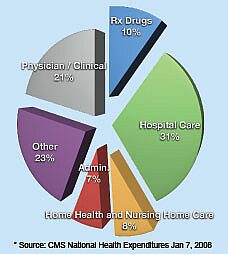Pharma typically refers to the pharmaceutical industry, a multi-billion dollar industry employing tens of thousands of Americans. The term Big Pharma refers to the largest of the pharmacological companies, which produce most of the commonly prescribed medications today. The term "Biotech" may also be applied to pharmaceutical companies, thought his term is usually reserved for the smaller pharmaceutical companies or those small pharma companies that focus on the production of more "biologicals" (e.g. antibodies, enzymes) rather than small molecule drugs. The term comes from the industry trade body, supported by companies, the Pharmaceutical Research and Manufacturers of America (PhRMA). Profits are very high but unstable, since it commonly takes more than a decade and and potentially billions of dollars to bring a new drug to market, and many promising drugs fail to make it due to safety, efficacy, and absorption issues. Once on the market, patents protect it for 17 years. In recent years the international industry has been consolidated as very large companies buy out large companies and biotechs. Along with improved nutrition and sanitation, the drugs produced by the pharmacological industry can be credited for much of the extension of the human lifespan in the 20th and 21st centuries.
In 1994 Pharma played a central role in defeating the Clinton health care package. In 2009, however, Big Pharma cut a deal with the Democrats, promising to cut drug costs by $80 billion over the next decade, and to support the Senate bill; in return they were promised they would not be hit by price controls and foreign drugs would not be allowed in.

